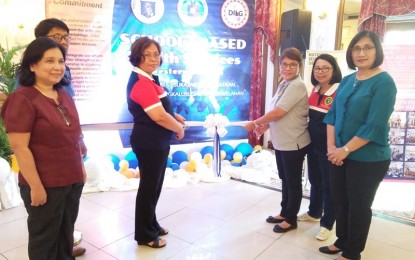
SCHOOL-BASED HEALTH SERVICES. Department of Health Assistant Regional Director Dr. Ma Julia Villanueva and Melgazar Barboza from Department of Education (3rd and 4th from left) cut the ribbon during the launching of the integrated school-based health services held at Punta Villa Resort in Arevalo, Iloilo City on Wednesday (May 2, 2018). (Photo by Perla Lena)
ILOILO CITY -- Three government agencies in Western Visayas have agreed to collaborate and integrate their efforts to carry out various school-based health services.
Dr. Renilyn R. Reyes, head of the Family Health and Nutrition Cluster of the Department of Health 6 (Western Visayas), said they are partnering with the Department of Education (DepEd) and the Department of the Interior and Local Government (DILG) for the integrated school health services.
The integrated health services will cover school-based immunization, deworming, and iron and folic acid supplementation.
The collaboration was marked with a three-day regional command conference on school-based health services that kicked off at the Punta Villa Resort in Arevalo district here Wednesday.
Reyes said that usually, the DOH is community-based but schools have served as “catchment of targeted children for targeted health services.”
With the integration, it is easier to extend the services because the children are already in school, she said, adding that this is “one big strategy that we would like to collaborate with DepEd.”
The participation of the DILG, on the other hand, is essential in terms of advocacy and during the mapping to determine “defaulters,” Reyes added in an interview.
Also, health workers coming from local government units (LGUs) are the ones handling the immunization, unlike the deworming and the weekly iron folate acid (WIFA) supplementation that are being administered by teachers with the help of school nurses.
Dr. Marie Jocelyn Te, DOH-6 Emerging and Re-emerging Infectious Diseases Coordinator, was hopeful that the integrated services would improve their coverage.
Deworming, which targets Kinder up to Grade 12 students, is held twice a year. It seeks to address soil-transmitted helminthiasis, which when left untreated could result in anemia, malnutrition, weakness, and impaired physical and cognitive development.
“Because of this integration of services, we can easily capture the target children. We expect for improved and increased deworming results,” Te said.
The result of deworming administered to secondary students in Western Visayas this January showed a 69 percent coverage of the 605,101 enrolled in public high schools.
The school-based immunization, meanwhile, will cover Grades 1 to 7 pupils, with Grade 1 pupils receiving Measles Containing Vaccine and Tetanus Diphtheria (TD), and Grade 7 students receiving Measles Rubella and TD vaccines.
All female students aged nine to 13 years will receive the Human Papillomavirus vaccine.
Moreover, Grades 7 to 10 students in all public schools will receive WIFA supplementation for 24 weeks, to be done in two rounds -- the first in July to September and the second in January to March.
Reyes underscored that all school-based health services have been proven effective and safe. (PNA)
